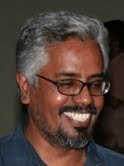speed track

Speed – Amibitions of Self-denial
Speed (with an apolegetic tag, Track), the debut film by Jayasurya is a film set in a sports school with a mellowed down Dileep as the hero. Though the 'story' is a very conventional one, Ranjan Abraham the editor and Ousepachan who scored the background music, have rendered it a very breezy pace that keeps it from floundering and flagging as it proceeds. It is also a film where Dileep, after several misadventures, plays a role that vibes with his persona.
Any narrative about sports is in one way about ambition and achievement and the film throws up several interesting questions about malayalee mindset. For us, personal achievement and ambition, one that is centred around an individual person's self is a sin. It is as if an individual is not allowed to pursue an end or an objective solely for the pleasure or benefit of oneself or for the sheer thrill of achievement alone. Invariably, such persons are portrayed as 'self-centred' and as a 'natural' fallout, as a villain within the narrative.
The pursuit of the hero has to be necessarily be something beyond, and more than a personal pursuit. In order to be 'heroic', it should be an excess that has to be displaced into a larger significance. The relentlessness of that pursuit has to be given a motive that lies beyond him or her, it has to be necessarily for the others, the family, community, nation etc. In this film, Dileep is a reluctant hero, his life is one that has already been sacrificed for others – financial problems forces him to relinquish a career of 'his own' in sports and to take up farming, in order to let his talented younger brother to pursue his dreams. The pursuit and ambition of this brother is suddenly shattered by an accident, for which the hero himself is instrumental; it is his hurry or speed that inadvertently caused it. (If on reads deeper meanings into it, was it a subconscious act to pave the way to pursue his own dreams?)
Speed (with an apolegetic tag, Track), the debut film by Jayasurya is a film set in a sports school with a mellowed down Dileep as the hero. Though the 'story' is a very conventional one, Ranjan Abraham the editor and Ousepachan who scored the background music, have rendered it a very breezy pace that keeps it from floundering and flagging as it proceeds. It is also a film where Dileep, after several misadventures, plays a role that vibes with his persona.
Any narrative about sports is in one way about ambition and achievement and the film throws up several interesting questions about malayalee mindset. For us, personal achievement and ambition, one that is centred around an individual person's self is a sin. It is as if an individual is not allowed to pursue an end or an objective solely for the pleasure or benefit of oneself or for the sheer thrill of achievement alone. Invariably, such persons are portrayed as 'self-centred' and as a 'natural' fallout, as a villain within the narrative.
The pursuit of the hero has to be necessarily be something beyond, and more than a personal pursuit. In order to be 'heroic', it should be an excess that has to be displaced into a larger significance. The relentlessness of that pursuit has to be given a motive that lies beyond him or her, it has to be necessarily for the others, the family, community, nation etc. In this film, Dileep is a reluctant hero, his life is one that has already been sacrificed for others – financial problems forces him to relinquish a career of 'his own' in sports and to take up farming, in order to let his talented younger brother to pursue his dreams. The pursuit and ambition of this brother is suddenly shattered by an accident, for which the hero himself is instrumental; it is his hurry or speed that inadvertently caused it. (If on reads deeper meanings into it, was it a subconscious act to pave the way to pursue his own dreams?)
With this 'accident' the hero has to come out of his self-denial to pursue success. Apparently, it is not for his personal glory, but to gain enough money to cure his brother. If earlier, the impediments to his ambition were familial and personal, even after he takes it upon himself, the impediments come again from within, this time from within the college, from his friends, class mates etc. Significantly, it is not his competitors from outside who threaten his ambitious pursuits and achievement of personal glory, but his own team mates. So, his amibitionxs and his efforts to achieve is played out as a constant struggle with one's own side rather than the world out there. So, the conquering of the outside world is nothing but the conquering of the enemies within. It becomes a sort of taming of the self, a struggle within one's fold.
Thus the assertion of the self ultimately turns out to be self-denial. Deeply running within such narratives is the sense of guilt about ambition and success, hence the obsessive need to justify it through extra-personal means. It is only by denying or finding larger rationale for my ambition that I can justify it to the outside world, and more tragically, to myself. Naturally, it is not the cheering of the crowd at the stadium or his college mates or his love that ultimately drives him to success but the clapping of his disabled brother. Any shade of the presence of one's self would be a disgrace.
This compulsive de-privileging of personal ambition and the need to constantly displace it onto something else, provides interesting insights into the tenuous relationship of the malayalee with any kind of succes and achievement.
Labels: dilip, malayalam cinema


0 Comments:
Post a Comment
Subscribe to Post Comments [Atom]
<< Home